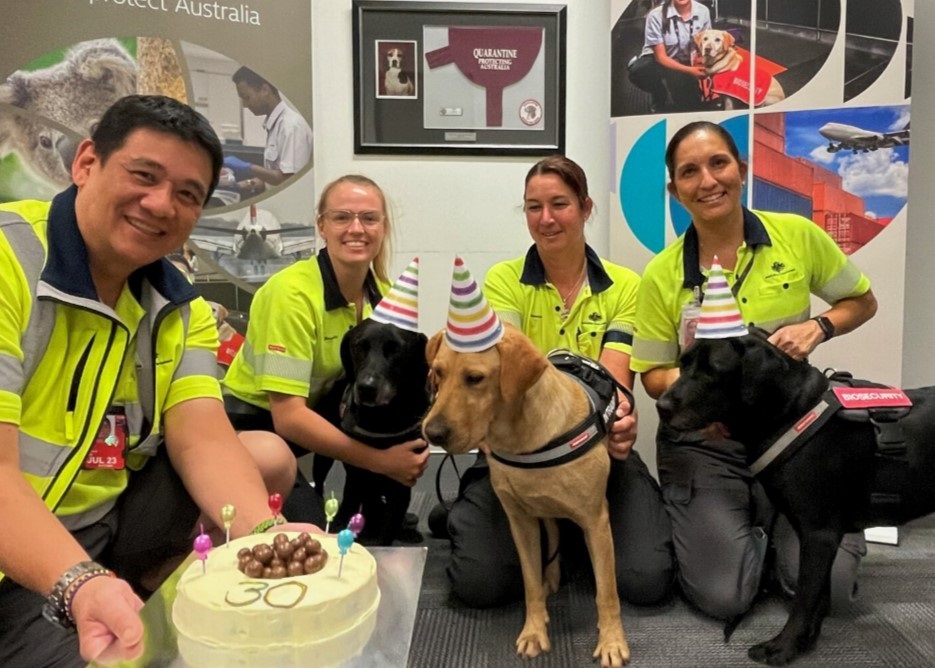
Some of Australia’s detector dog team members.
AUSTRALIA’S biosecurity detector dog program is hoping to get a big boost with the training and hiring of about 30 extra handlers.
Handler applications for the program opened yesterday to boost the ranks of the 43 detector dogs currently working in airports, mail and cargo centres.
Sheep Central believes all passengers coming back from Indonesia are assessed or profiled, but only those deemed to be a risk after profiling have their luggage checked by detector dogs.
To help prevent any passenger-borne Foot and Mouth Disease incursions, the Department of Agriculture Forestry and Fisheries is using detector dogs on mail from China and Indonesia, and among passengers from Indonesia.
A passenger may be intervened with by a biosecurity officer for targeted questioning, X-ray screening, detector dog screening or baggage inspection,” a DAFF spokesperson has told Sheep Central.
The current handler recruitment will fill positions in Brisbane (QLD), Cairns (QLD), Darwin (NT), Melbourne (VIC), Perth (WA) and Sydney (NSW). The pay range is $69,905 – $76,103 per annum plus superannuation. The positions are classified at the APS4 level within the Australian Public Service.
Applicants are assessed on meeting the essential criteria and fitness requirements of being a handler. This is assessed through application, an interview, a practical exercise and a specific medical assessment by a suitably qualified medical practitioner.
A DAFF spokesperson said the department sources its detector dogs, all Labrador Retrievers, from the Australian Border Force detector dog breeding program.
“These dogs have been selectively bred for generations to ensure they have the optimal temperament, health and physical traits required to be fantastic detector dogs.
“For this reason, the department does not source dogs directly from the public or utilise detector dog handlers’ own dogs.”
The department said on average, our detector dogs can be expected to find up to 9,000 biosecurity risk items during their working life. The three most common items the detector dogs find are meat, seeds and fruit.
Last financial year, Australia’s detector dogs intercepted approximately 16,000 biosecurity risk items. The three most detected items included meat, seeds and fruit which could all carry pests and diseases that would seriously harm our environment, agricultural industries and economy if they were to establish here.
A fun job and an important biosecurity role
DAFF’s first assistant secretary of biosecurity operations Colin Hunter said Australia’s detector dog program is world class in detecting biosecurity risk items in the airport, seaport and mail pathways.
“The biosecurity detector dog program is just one of the detection tools used by our department.
“Being a detector dog handler and working with dogs daily is a fun job that also plays an important role in Australia’s biosecurity system,” he said.
“We’re looking for candidates who are engaging, resilient and results driven.
“To be a biosecurity detector dog handler, you need to be a fully accredited and operational biosecurity officer,” Mr Hunter said.
“This is why, in recent times, recruitment for these positions has been an internal process.
“This new recruitment round is open to the general public and we encourage all who are interested to apply,” he said.
“Successful applicants will receive biosecurity foundation training as well as detector dog handler training to prepare them for the scenarios they may experience when deployed across our operation pathways.
“With international travel increasing following the opening of borders after COVID, and increased volumes in the mail and seaport pathways, the department requires additional biosecurity detector dog handlers to join the front line of biosecurity,” Mr Hunter said.
“It’s a great opportunity to join this specialised team and work with amazing canine and human colleagues to help protect Australia against biosecurity risks.
“Detector dogs are fast, versatile and mobile with a key role in strengthening our biosecurity systems in response to a growing biosecurity threat,” he said.
“This year our detector dog program celebrates 30 years of helping to protect Australia from exotic pests and diseases, which is definitely a paws for a celebration.”
For more information on Australia’s detector dogs click here.
Click here to apply to be a detector dog handler.

HAVE YOUR SAY